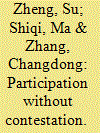| Srl | Item |
| 1 |
ID:
145179


|
|
|
|
|
| Summary/Abstract |
Many studies have examined the significant involvement of Christian organizations in national-level politics since the revitalization of democracy in Africa in the 1990s, but few have focused on local faith-based organizations engaged in grassroots citizen mobilization. This article compares two such organizations rooted in local communities in Zambia and South Africa in order to elucidate their role. On the basis of interviews, document analysis, and participant observations conducted in 2011, 2013, and 2014, we find that the greater the autonomy a Pentecostal organization enjoys from external partners and the more independence its leader enjoys in decision making, the more likely it is to engage in local citizenship mobilization. However, while these structural factors may facilitate change, they are unlikely to result in new political strategies being pursued unless they are combined with a form of visionary leadership that seeks to promote citizenship. Our findings explain new forms of Pentecostal political involvement, particularly at the grassroots level, by showing how some leaders have used their churches' autonomous structures to promote political engagement.
|
|
|
|
|
|
|
|
|
|
|
|
|
|
|
|
| 2 |
ID:
186947


|
|
|
|
|
| Summary/Abstract |
How do non-governmental organizations (NGOs) advocate public policies? What impacts their advocacy strategies? Although scholars have addressed these questions in a democratic context, less is known about NGO advocacy under powerful authoritarian regimes. Using China as a case study, we develop an institutional explanation of NGOs’ policy advocacy patterns and explore the impacts of NGO autonomy. Using a unique dataset of registered NGOs in three Chinese provinces, we find that NGOs with more autonomy tend to conduct direct negotiations with the government more actively (more political advocacy). However, these more autonomous NGOs are likely to be more hesitant to mobilize society from the bottom up (less social advocacy). These findings enrich our knowledge of social actors’ roles in the policymaking process in China.
|
|
|
|
|
|
|
|
|
|
|
|
|
|
|
|
| 3 |
ID:
165162


|
|
|
|
|
| Summary/Abstract |
Bureaucracies with field operations that cannot be easily supervised and monitored by managers are caught between two sources of dysfunction that may harm performance. The first source of dysfunction is straightforward: field workers can use operating slack and asymmetric information to their own advantage, thwarting an organization's objectives. The second source of dysfunction is often overlooked: attempts to limit workers’ autonomy may have deleterious effects, curbing agents’ ability to respond efficaciously to the environment. I find that the parliaments and executive boards to whom International Development Organizations (IDOs) are accountable differentially constrain IDO organizational autonomy, which in turn affects management's control of field agents. Tight management control of field agents has negative effects, particularly in more unpredictable environments. Attempts by politicians to constrain organizations in an effort to improve performance can sometimes be self-undermining, having net effects opposite those intended.
|
|
|
|
|
|
|
|
|
|
|
|
|
|
|
|